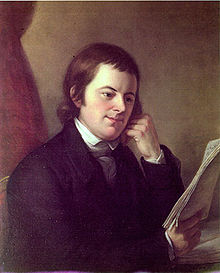Thomas Johnson (jurist)
| Thomas Johnson | |
|---|---|
 |
|
| Associate Justice of the Supreme Court of the United States | |
|
In office August 5, 1791 – January 16, 1793 |
|
| Appointed by | George Washington |
| Preceded by | John Rutledge |
| Succeeded by | William Paterson |
| 1st Governor of Maryland | |
|
In office March 21, 1777 – November 12, 1779 |
|
| Preceded by | Robert Eden (Royal) |
| Succeeded by | Thomas Lee |
| Personal details | |
| Born |
November 4, 1732 St. Leonard, Maryland, British America |
| Died | October 26, 1819 (aged 86) Frederick, Maryland, U.S. |
| Political party | Federalist |
| Signature | |
Thomas Johnson (November 4, 1732 – October 26, 1819) was an American jurist with a distinguished political career. He was the first Governor of Maryland, a delegate to the Continental Congress, and an Associate Justice of the Supreme Court of the United States.
Johnson was born in Calvert County, Maryland, on November 4, 1732 to Thomas and Dorcas Sedgwick Johnson. His grandfather, also named Thomas, was a lawyer in London who had emigrated to Maryland sometime before 1700. He was the fourth of ten children, some of whom also had large families. His niece (daughter of his brother Joshua ), Louisa Johnson, married John Quincy Adams.
The family, including Thomas, were educated at home. As a young man he was attracted to the law, studied it, and was admitted to the Maryland bar in 1753. By 1760, he had moved his practice to Frederick County, Maryland, and in 1761 he was elected to the provincial assembly for the first time. Johnson married Ann Jennings, the daughter of a judge from Annapolis on February 16, 1766.
The couple had eight children: Thomas Jennings, Ann Jennings, Rebecca (who died in infancy), Elizabeth, Rebecca Jennings, James, Joshua, and Dorcas.
In 1774 and 1775 the Maryland assembly sent him as a delegate to the Continental Congress. In the Congress he was firmly in the camp of those who favored separation from Great Britain. In November 1775, Congress created a Committee of [Secret] Correspondence that was to seek foreign support for the war. Thomas Johnson, along with Benjamin Franklin, and Benjamin Harrison V were initially named to the committee.
...
Wikipedia
